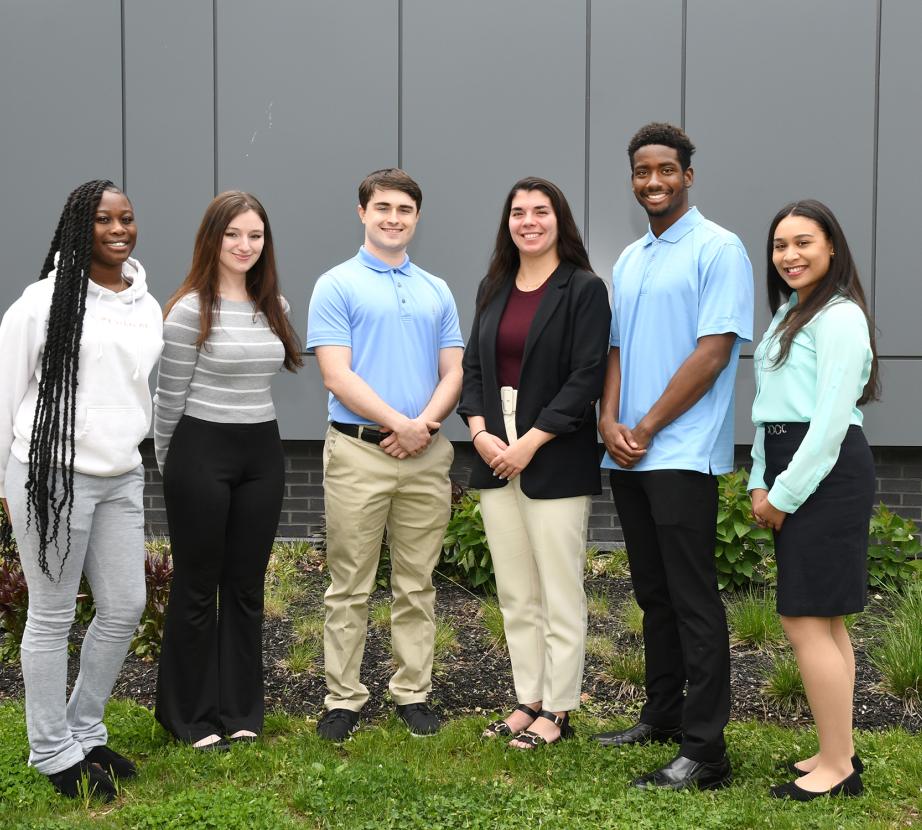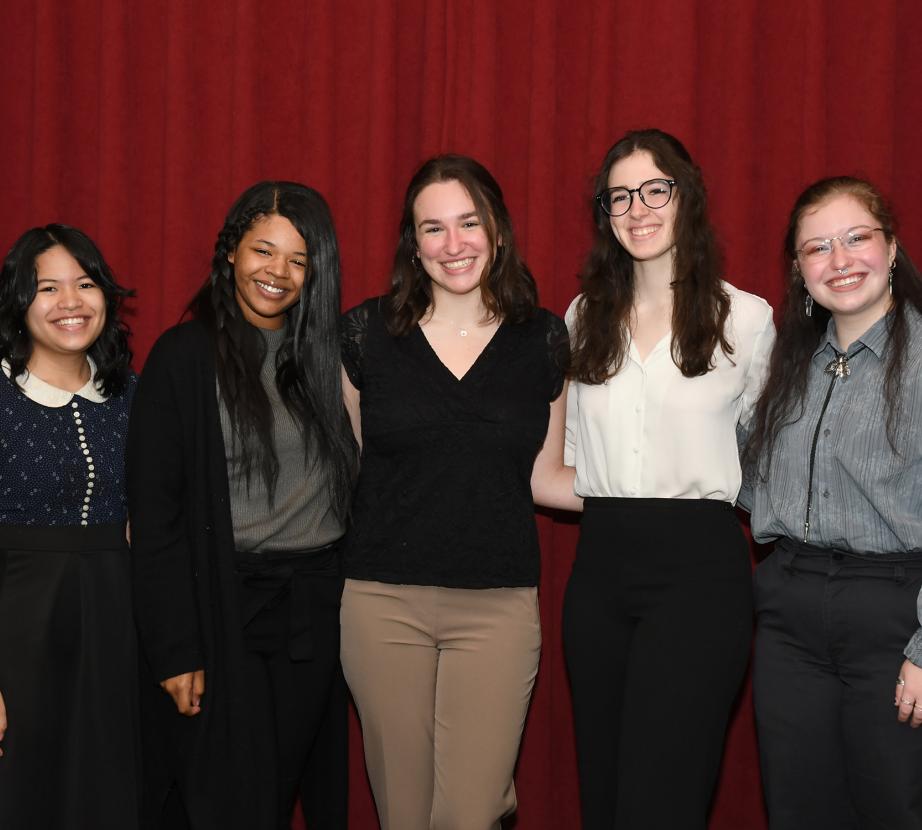About the URSA program
One of the best things about the Rider experience is the opportunity students have to collaborate with faculty. Whether it’s fine arts students directing, performing or lighting a stage production alongside faculty, students performing with a faculty conductor at the New York Philharmonic or a science student partnering in research with a faculty mentor, you’ll be able to work, learn and have fun alongside our amazing Rider faculty.
The Undergraduate Research Scholar Awards program was established during the 2003-04 academic year to encourage and award excellence in independent student research and scholarship, to enhance collaborative work between students and faculty, and to heighten the intellectual atmosphere on campus. This $1,000 research scholarship supports student work above and beyond ordinary coursework performed under the supervision of faculty members across the entire array of disciplines at our various colleges. Students can work directly with faculty on joint research projects or on independent projects under the supervision of a faculty member(s). Students may also collaborate on a research project under the supervision of a faculty member(s). Students interested in applying for Undergraduate Research Scholar Awards (URSA) should start planning early, discuss potential projects with a faculty sponsor(s). Applications are accepted in late March each year.
About the Awards
URSA/ISCAP DAY, our celebratory events, will be on May 8, 2025. URSA presentations will be in the Rue Auditorium in the Sweigart Building from 10 a.m. - Noon.
ISCAP posters will be on display with their researchers/creators from 12:30 - 2:30 p.m. in the first-floor lobby of Sweigart.
- Five $1,000 awards will be made this year, provided the selection committee receives sufficient applications that are deemed meritorious.
- The $1,000 awards are used as scholarships, allocated as $500 to selected students’ fall and spring bills.
- This award is applied toward tuition costs, so any student who has received a full-tuition Trustee Scholarship is not eligible to apply.
- Awards for the spring semester are contingent on sufficient progress and program participation in the fall semester.
- Awards may be used for undergraduate research in any semester(s) or session(s) with a single year defined as beginning on July 1.
- The Registrar will add the notation “Undergraduate Research Award Recipient” to each selected student’s transcript.
Past URSA Recipients (PDF)
- Press release for 2022 winners
- Press release for 2018 winners
- Press release for 2017 winners
- Press release for 2016 winners
- Press release for 2015 winners
- Press release for 2014 winners
Independent Scholarship & Creative Activities Presentations (ISCAP) Day
For more information about the Undergraduate Research Scholar Award program, contact Dr. Kathy K. Price, Professor of Voice, URSA chair, at [email protected].
Pertinent information about the eligibility requirements and application process follows.
Eligibility Requirements
- At the time of application and through the project period, applicants must be matriculated students, in good academic standing, and in pursuit of their first bachelor’s degree at Rider University.
- Applicants must have completed at least 24 Rider credits by the time the project is begun, but still have a full year of coursework remaining so they can present their findings at ISCAP Day in the Spring semester.
- Applicant’s faculty sponsor(s) must verify the applicant’s eligibility with the appropriate Dean’s Office.
- Trustee Scholars or other students with full scholarships are not eligible to apply.
Responsibilities of Selected Scholars
- Scholars must work under the supervision of a sponsoring faculty member(s). Students typically enroll in XXX-490 with their project advisor fall and spring semesters. These classes carry 3 credits and appear as "Independent Study" on the student's transcript.
- Selected scholars must remain full-time students and maintain good academic standing during the scholarship year.
- Scholars are expected to make at least two campus presentations about their work, one brief introduction at the Undergraduate Research Scholarship Award (URSA) Recognition event of the application year and one longer presentation at the same event the following year, after successful completion of the project. The URSA Recognition event is held in the final days of each spring semester. Your advisor is expected to introduce you at both events. The first presentation should outline the scope and purpose of the work to be done and the latter presentation should summarize the completed research and its significance.
- An interim report detailing work done on the project during the fall semester must be submitted to the URSA Chair by the last day of finals. View interim report guidelines (PDF).
- The project should be completed in full by the last day of finals for spring semester and submitted to the URSA Chair.
- Scholars are strongly encouraged to present their work at local, regional and national meetings, conferences or venues; to submit their work for relevant prizes and awards; and to publish their work in an appropriate academic forum when possible.
The Selection Process
Awards will be distributed based, primarily, on the merit of the proposals and efforts will be made to distribute awards across a wide range of disciplines as well as across different schools or colleges (Norm Brodsky College of Business; College of Arts and Sciences; and the College of Education and Human Services). The committee will normally support no more than one project in an academic department and no more than two projects in a given school or college. The location in a given department, program, school or college is defined by the academic discipline of the project, not the student’s major or school/college of registration.
The committee judges the applications on the following criteria:
- Quality, clarity, and completeness of project description.
- Significance and originality of project, with respect to both the discipline and the student.
- Appropriateness of approach and/or method.
- Feasibility of project completion and specificity of timeline.
- Clarity and specificity of expected outcomes.
- Adherence to the format requirements detailed below.
- Faculty recommendation.
Application
The application deadline for the 2025-2026 academic year is Monday, April 14, 2025 at 5 p.m. To conserve resources, submissions will be accepted electronically through email only. Students may email their complete applications to Dr. Kathy K. Price at [email protected]. An email will confirm that the application was received and submitted to the committee for review.
Download the Application (PDF)
A complete application consists of the following sections submitted as a SINGLE electronic file (PDF or Word document) in the order indicated, and must not exceed five pages in length, excluding cover sheet and recommendation letter.
- Proposal Cover Sheet: (Include the following information on one page)
- Project Title
- Applicant’s Name
- Major(s) and Minor(s)
- College (Norm Brodsky College of Business; College of Arts and Sciences; and the College of Education and Human Services)
- Name(s) and Department(s) of Faculty Mentor(s)
- Graduation (expected month/year)
- Contact information
- Date
- Abstract: (a 100-word or less summary of your project)
- Project Description: A more detailed explanation of your project emphasizing the following criteria—research question or problem; purpose, significance and originality of project; approach and/or method; and expected outcomes, including discipline-specific format (e.g., paper, poster, presentation). This should be written clearly and concisely with a minimum of technical jargon, accessible to a multidisciplinary review committee.
- Project Timeline: Timeline for project completion, including major steps in research process, plans for presentations and submission of interim report and final project. The timeline should not exceed one page.
- Project Bibliography: References to the most important literature on the topic should be presented in a format appropriate for the discipline (e.g., MLA, APA, Chicago style).
- Letter of Recommendation from Faculty Advisor: Letter may be submitted with the application as a single word file or pdf, or separately by the faculty mentor, by the deadline. This letter should be written in non-technical language accessible to a multidisciplinary faculty committee and should emphasize:
- The student’s qualifications and preparation for the project
- The project’s significance, both to the discipline and to the student’s learning
- Mentor plan, including support activities such as regular meetings and assessment of progress, and the probability of completion in the proposed time
- Expected outcomes, including discipline-specific format (e.g., paper, poster, presentation)
- Previous experience as a mentor for undergraduate research


